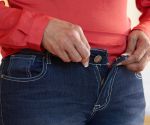Weight Loss = Calories Consumed < Calories Burned
That is, if you consume less than you burn over time you lose weight. The opposite is also true. If you consume more calories than you burn, you gain weight. Consuming the same as you burn maintains your weight. Key factors to help you lose weight include paying attention regularly by tracking calories daily (or at least until you can do it “automatically”) and weigh or measure yourself at least once a week to make sure you are trending towards your goal.
A good weekly goal is to lose ½ to 2 pounds per week or approximately 1% body fat every two weeks. The number of calories you eat to accomplish this needs to be approximately 250 to 1000 calories less than your daily calorie burn. The more overweight the person, the greater the allowed weekly loss.
Be sure to weigh or measure yourself in the same clothing, at the same time and on the same scale. Take care to also use the same method or device if you’re having your body fat measured.
A measurable or visual reduction in body fat or weight should take place in a fairly consistent manner. This includes a decrease in circumference inches, pounds or clothing fit. If progress stops or slows dramatically, one or a mixture of the following adjustments will be necessary to re-start the process:
- Increase daily activities with more daily steps or other non-exercise activities. Standing and pacing burns at least 2-3 times more calories than sitting for the same time period. There are approximately 2000-2500 steps (depending on stride length) in a mile. Walking 2000 steps will burn ~75-150 more calories (depending on individual size) than sitting for the same time and only takes 20-30 min. This can be done anywhere, even in the office, while on the phone or watching TV
- Increase workout time or intensity
- Decrease food intake approximately 200 to 300 calories per day or remove a small portion of your largest meal
Repeat the process any time weight or body fat is stable for two consecutive weeks. Always remember if you stop losing weight/fat you need to eat less, move more or a combination of the two regardless of what you read or hear from others. Once you have achieved your body composition goals, increase your calorie intake, decrease activities or a combination of the two in order to maintain desired weight.
Total Calories in < Total Calories burned/out = Weight Loss. It takes ~3500 calories to add or lose 1 pound of fat! Ideally, you want to do this gradually, start by creating a deficit of ~500calories/day x 7 days = ~1# weight loss.A registered dietitian can provide you with detailed and individualized guidelines to assist with your weight loss needs.
One pound of fat is equivalent to 3500 calories. Therefore if your goal is to lose weight you will want to create a daily negative calorie balance. Decreasing your caloric intake by 500-1000 calories per day, should result in an approximate 1-2 pound weight loss per week.
Continue Learning about Weight Loss
Important: This content reflects information from various individuals and organizations and may offer alternative or opposing points of view. It should not be used for medical advice, diagnosis or treatment. As always, you should consult with your healthcare provider about your specific health needs.












